<continued from Jitter 102B>
An interesting experiment is to throw in a deterministic term not related to the signal. Below is a plot with the jitter modulated by a 120 Hz signal, such as would come from a typical full-wave power supply, again at the 1-lsb level. Note the ENOB did not change significantly, but now there is a pair of spurs around the 1 kHz signal. Other frequencies, and more complex combinations of deterministic jitter, can generate a series of tones that are not related to the signal. This is important because we can hear non-harmonic distortion much more readily than harmonic distortion.
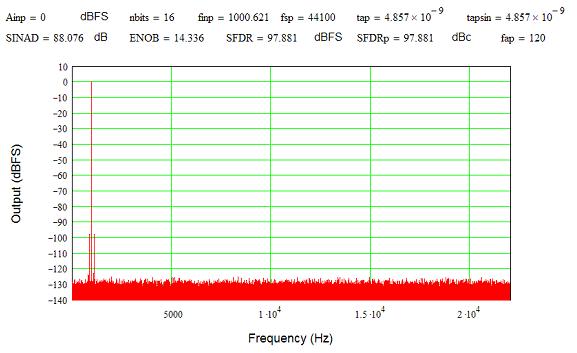
Repeating the plot at 10 kHz with 1 lsb of 10 kHz signal injected puts a spur at 20 kHz at the same level as in the 1 kHz plot, just like the first trials. Using the 1 kHz jitter level as modulated by the 10 kHz signal yields a fairly high (about -76 dBFS) distortion term.
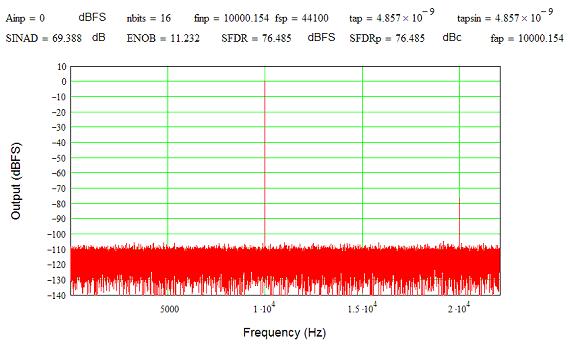
One last series of trials… Here’s a plot using five input tones (1, 2, 3, 5, and 10 kHz) without jitter. Notice the tones are all about 10 dB down; this is because when the all add up (in phase), they drive the DAC to full-scale, even though the average is -10 dB per tone. Music is much more complex thus average values are often -20 dBFS or less to ensure the output doesn’t clip (and sound very, very bad). This eats into your dynamic range pretty quickly, and helps explain why what appears to be low jitter can start to impact the ‘real world” noise floor. It also helps explain why recording systems and studios really like using 24 bits; that extra headroom is a boon when working with everything in the mix before the amplitudes are matched and the signal made to fit back into 16 bits for your CDs.
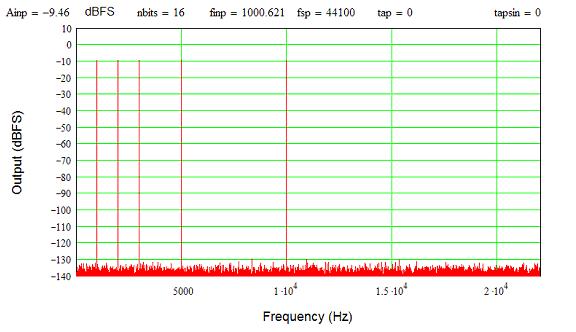
Here are those same tones but with 5 ns (1 lsb at 1 kHz again) of jitter added, along with 1 lsb of the 1 kHz tone added to the jitter. Note the multiple tones added as the deterministic jitter mixes with the other tones through the sampling process. The effective SFDR is now only about 75 dB from peak signal to peak spur…
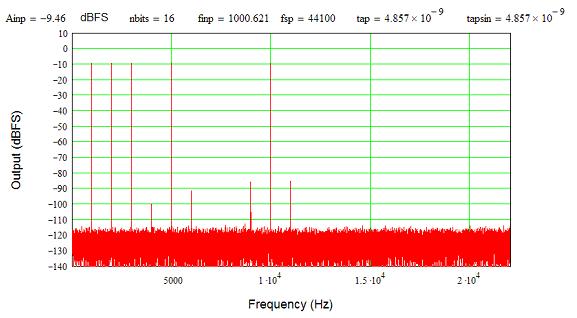
My last example is those same five tones, but with the 5 kHz tone reduced 20 dB (about ¼ volume) to emulate what might happen in (very simple) music. I moved the deterministic jitter to 120 Hz, though still at 5 ns (1 lsb at 1 kHz). The distortion spurs are much more numerous and only about 60 dB down (worst-case) from the reduced 5 kHz tone. Would you hear this? I don’t know, but probably not. However, it is clear that as we move toward more complex signals like music, and correspondingly more complex and realistic jitter, we are heading toward something that could be readily audible.
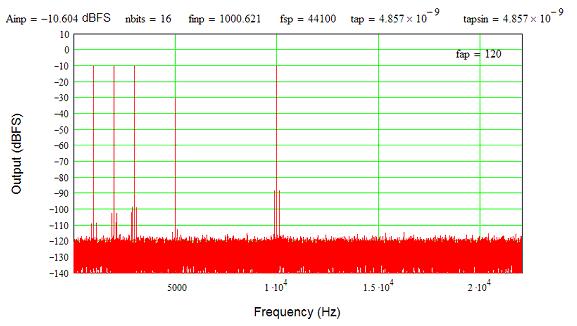
Hopefully this has given you a picture of what jitter can do, and a flavor for the real-world impact it might have. My goal was not a realistic, musical example (readily done but the plots would be very messy), but rather something that helps clearly show what jitter does to DAC performance. Thus, I have not used complicated signals so (hopefully) it is easy to see what happens when jitter is added.
Enjoy! - Don
An interesting experiment is to throw in a deterministic term not related to the signal. Below is a plot with the jitter modulated by a 120 Hz signal, such as would come from a typical full-wave power supply, again at the 1-lsb level. Note the ENOB did not change significantly, but now there is a pair of spurs around the 1 kHz signal. Other frequencies, and more complex combinations of deterministic jitter, can generate a series of tones that are not related to the signal. This is important because we can hear non-harmonic distortion much more readily than harmonic distortion.

Repeating the plot at 10 kHz with 1 lsb of 10 kHz signal injected puts a spur at 20 kHz at the same level as in the 1 kHz plot, just like the first trials. Using the 1 kHz jitter level as modulated by the 10 kHz signal yields a fairly high (about -76 dBFS) distortion term.

One last series of trials… Here’s a plot using five input tones (1, 2, 3, 5, and 10 kHz) without jitter. Notice the tones are all about 10 dB down; this is because when the all add up (in phase), they drive the DAC to full-scale, even though the average is -10 dB per tone. Music is much more complex thus average values are often -20 dBFS or less to ensure the output doesn’t clip (and sound very, very bad). This eats into your dynamic range pretty quickly, and helps explain why what appears to be low jitter can start to impact the ‘real world” noise floor. It also helps explain why recording systems and studios really like using 24 bits; that extra headroom is a boon when working with everything in the mix before the amplitudes are matched and the signal made to fit back into 16 bits for your CDs.

Here are those same tones but with 5 ns (1 lsb at 1 kHz again) of jitter added, along with 1 lsb of the 1 kHz tone added to the jitter. Note the multiple tones added as the deterministic jitter mixes with the other tones through the sampling process. The effective SFDR is now only about 75 dB from peak signal to peak spur…

My last example is those same five tones, but with the 5 kHz tone reduced 20 dB (about ¼ volume) to emulate what might happen in (very simple) music. I moved the deterministic jitter to 120 Hz, though still at 5 ns (1 lsb at 1 kHz). The distortion spurs are much more numerous and only about 60 dB down (worst-case) from the reduced 5 kHz tone. Would you hear this? I don’t know, but probably not. However, it is clear that as we move toward more complex signals like music, and correspondingly more complex and realistic jitter, we are heading toward something that could be readily audible.

Hopefully this has given you a picture of what jitter can do, and a flavor for the real-world impact it might have. My goal was not a realistic, musical example (readily done but the plots would be very messy), but rather something that helps clearly show what jitter does to DAC performance. Thus, I have not used complicated signals so (hopefully) it is easy to see what happens when jitter is added.
Enjoy! - Don
Last edited:

